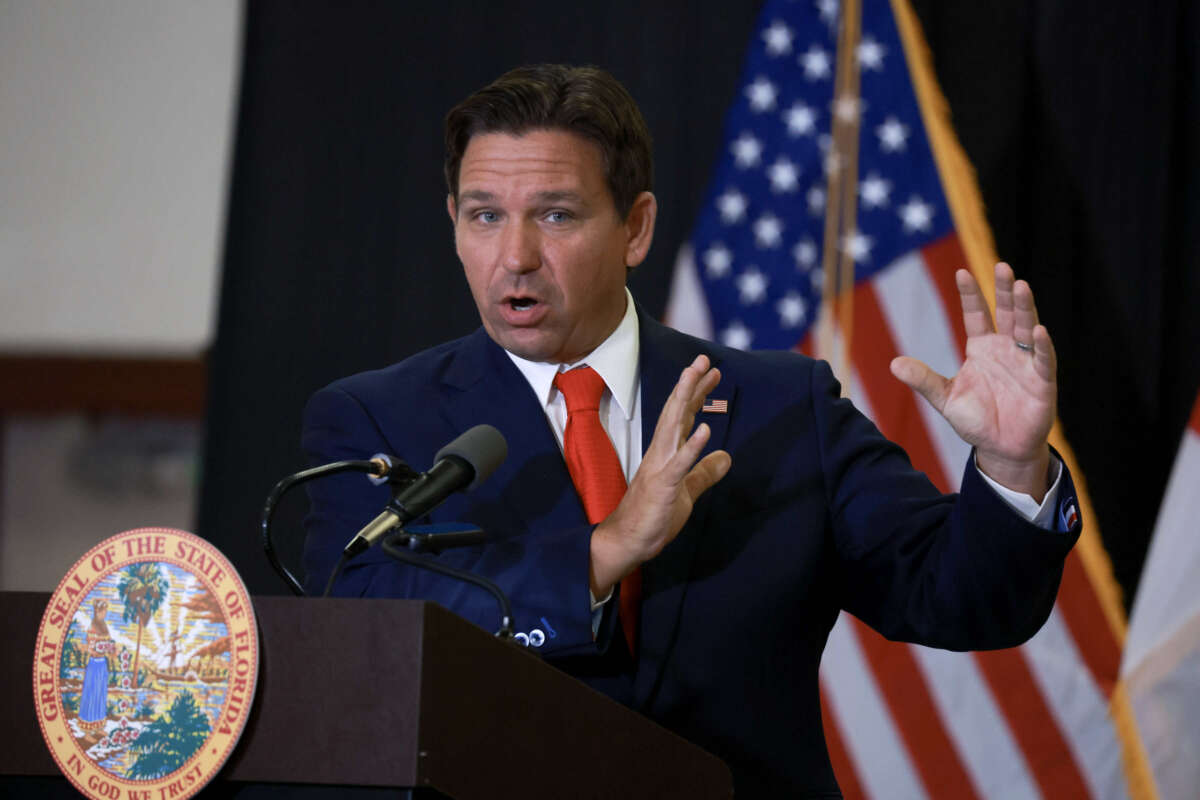Honest, paywall-free news is rare. Please support our boldly independent journalism with a donation of any size.
The administration of Florida Republican Gov. Ron DeSantis has threatened a television station with legal repercussions if they continue to air a political ad on their broadcast stream.
Like many other states, Florida is set to hold a vote on its ballot this November relating to abortion rights. The proposed measure, formally known as Amendment 4, would enshrine abortion rights in the state constitution, allowing for people to obtain the procedure up to the point of fetal viability, generally regarded to be around 22-25 weeks of pregnancy.
Florida’s current law bans abortion after six weeks of pregnancy, a point of gestation in which many people aren’t even aware that they’re pregnant, making it one of the harshest anti-abortion statutes in the country. It makes limited exceptions for rape or incest, as well as for cases where the life of a pregnant person is at risk.
“Life exceptions” like Florida’s, however, are often in name only, as exceptions are written so vaguely that physicians are unsure of whether they’d be in legal jeopardy if they were to perform a life-saving abortion. Consequently, doctors in these states routinely refuse to perform abortions in medical emergencies, putting a person’s life and/or health at risk in such cases.
The ad in question shows one example of how abortion could be restricted in a life-or-death scenario. Entitled “Caroline,” the advertisement features a woman describing how she was diagnosed with brain cancer while pregnant and had to receive an abortion to save her life, before Florida’s ban was in place.
“The doctors knew if I did not end my pregnancy, I would lose my baby, I would lose my life, and my daughter would lose her mom,” Caroline says in the ad, adding that, in cases like hers, the state now bars doctors from performing abortions.
That assertion — which is based on examples of pregnant people being denied abortion care in similar situations — resulted in the DeSantis administration sending a tersely worded letter to WFLA, the NBC affiliate station in Tampa.
The ad purports that the law “does not allow physicians to perform abortions to preserve the lives and health of pregnant women,” the letter read. “This claim is categorically false.”
The letter further argued that the ad is in violation of the state’s “sanitary nuisance” law, and threatened the station and its employees with “criminal proceedings” if it continues to air the ad.
“While your company enjoys the right to broadcast political advertisements under the First Amendment of the United States Constitution…that right does not include free rein to disseminate false advertisements,” stated the letter, signed by John Wilson, general counsel for the Florida Department of Health. (Notably, that department itself is currently disseminating blatantly false information to state residents regarding coronavirus booster shots and other information about COVID-19.)
Lawyers representing Floridians Protecting Freedom, which produced the ad, blasted the DeSantis administration for its threatening letter to the news station.
“The Department cannot criminalize media outlets running political advertisements with which it disagrees…The Department’s letter is a flagrant abuse of power and must be rejected,” that response letter said.
The chair of the Federal Communications Commission (FCC) also expressed dismay at the letter from the DeSantis administration.
“The right of broadcasters to speak freely is rooted in the First Amendment. Threats against broadcast stations for airing content that conflicts with the government’s views are dangerous and undermine the fundamental principle of free speech,” FCC chair Jessica Rosenworcel said in a statement.
Despite the DeSantis administration’s claims, the wording of the exceptions in Florida’s abortion ban is vague enough that health care providers could be stifled from performing abortions in cases similar to Caroline’s, even if the procedure would save a pregnant person’s life.
In many cases and depending on what stage a person is in, pregnancy can make it more difficult to treat certain cancers. But under Florida’s six-week ban, abortions are only allowed if “the termination of the pregnancy is necessary to save the pregnant woman’s life.” While terminating a pregnancy to help a cancer patient heal from a brain surgery may help save their life in the long term, the act of termination itself wouldn’t be a life-saving action, thus creating questions over whether an abortion like Caroline’s would be permitted.
The abortion amendment, while popular, faces long odds. A recent New York Times/Siena College poll shows that a plurality of Floridians back the proposal, with 46 percent saying they plan to vote for it. Only 38 percent oppose the measure, while 16 percent are unsure.
However, passing an amendment to the state constitution in Florida requires a supermajority — any proposed measure must receive 60 percent support from voters taking part in the question. While the amendment may get majority backing, the likelihood of it passing with that rate of support is very low, according to the poll, as it would require nearly all of the undecided voters to side with those who support the proposal.
Trump is silencing political dissent. We appeal for your support.
Progressive nonprofits are the latest target caught in Trump’s crosshairs. With the aim of eliminating political opposition, Trump and his sycophants are working to curb government funding, constrain private foundations, and even cut tax-exempt status from organizations he dislikes.
We’re concerned, because Truthout is not immune to such bad-faith attacks.
We can only resist Trump’s attacks by cultivating a strong base of support. The right-wing mediasphere is funded comfortably by billionaire owners and venture capitalist philanthropists. At Truthout, we have you.
Truthout has launched a fundraiser to raise $41,000 in the next 7 days. Please take a meaningful action in the fight against authoritarianism: make a one-time or monthly donation to Truthout. If you have the means, please dig deep.
